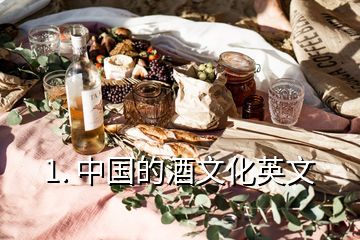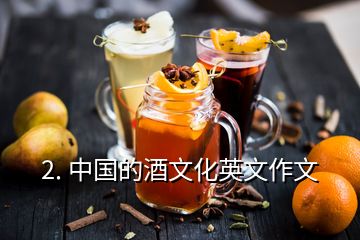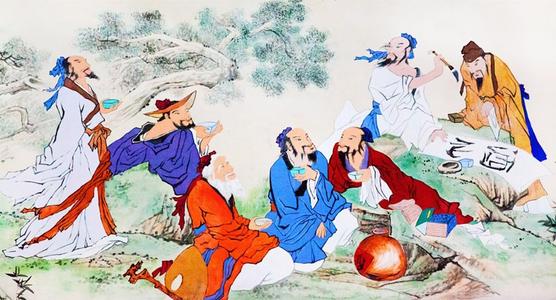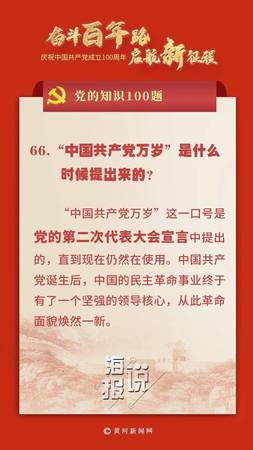1. 中国的酒文化英文

中国酒文化 [网络] chinese wine culture; [例句]中国酒文化博大精深,涵盖酿酒业方方面面,是祖国的宝贵文化遗产,在世界酒文化之林独领风骚。 China culture of alcoholic beverages has rich and deep meanings, including everything in liquor-making industry.
2. 中国的酒文化英文作文

画蛇添足
楚国有一个专管祭祀的官员,祭祀完成后倒了一杯酒给手下,因为人多酒少不够分,就想出一个办法,谁先画好蛇就喝酒,第一个人画好后,见其他人没有画完,就在自己画好的蛇上加了两只脚,让人啼笑皆非。
There was an official in charge of offering sacrifices to the people in the State of Chu. After the sacrifice, he poured a cup of wine to his subordinates. Since there were too many people and too little wine to share, he worked out a plan: whoever finished the snake first would drink the wine.
3. 中国的酒文化英文视频
酒 alcohol 酒精, 酒diddle 酒drink 饮料, 酒tiff 酒tipple 烈酒spirit 烈酒beer 啤酒wine 葡萄酒vino 酒water of life 生命之水, 酒wet goods 酒
4. 中国的酒文化英文介绍
CIDER is an alcoholic beverage made by the fermentation of pure fruit juice.
5. 中国的酒文化英文ppt模板免费
酒水类的ppt可以先将酒水的图片进行展示,然后再详细的介绍酒的种类
6. 中国的酒文化英文翻译
1、 酒与英雄襟怀
英雄与酒缘分甚深,你中有我,我中有你,难以区分。酒往往能给英雄以力量、气魄和襟怀。
①、对酒当歌,人生几何?(曹操《短歌行》)
②、酒酣胸胆尚开张,鬓微霜,又何妨!(苏轼《江城子•密州出猎》)
③、一生大笑能几回,斗酒相逢须醉倒。(岑参《凉州馆中与诸判官夜集》)
④、葡萄美酒夜光杯,欲饮琵琶马上催。(王翰《凉州词》)
⑤、新丰美酒斗十千,咸阳游侠多少年。(王维《少年行》)
⑥、酾酒问蟾兔,肯去伴沧州?(范成在《水调歌头》)
⑦、醉里挑灯看剑,梦回吹角连营。(辛弃疾《破阵子》)
⑧、浊酒一杯家万里,燕然未勒归无计。(范仲淹《渔家傲》)
⑨、不须携酒登临,问有酒何人共斟?(戴复古《柳梢青》)
⑩、一壶浊酒喜相逢,古今多少事,都付笑谈中。(杨慎《临江仙》)
2、 酒与怀人惜别
人世间总少不了亲朋好友的离散聚合,离别或思念之时,酒往往成为情感的使者。
①、今宵酒醒何处?杨柳岸晓风残月。(柳永《雨霖铃》)
②、日暮酒醒人已远,满天风雨下西楼。(许浑《谢亭送别》)
③、但使主人能醉客,不知何处是他乡。(李白《客中作》)
④、洛阳亲友如相问,一片冰心在玉壶。(王昌龄《芙蓉楼送辛渐》)
⑤、为君沉醉又何妨,只怕洒醒时候、断人肠。(秦观《虞美人》)
⑥、九日清尊欺白发,十年为客负黄花。(陈师道《九日寄秦观》)
⑦、我自只如常日醉,满川风月替人愁。(黄庭坚《夜发分宁寄杜涧叟》)
⑧、明月楼高休独倚,酒入愁肠,化作相思泪。(范仲淹《苏幕遮》)
⑨、我亦且如常日醉,莫叫弦管作离声。(欧阳修《别滁》)
⑩、劝君更尽一杯酒,西出阳关无故人。(王维《送元二使安西》)
3、 酒与遣兴抒怀
古往今来,多少文人墨客借酒兴怀,酒后成篇,这时的酒往往成为他们心路历程、情感历程的象征。
①、明月几时有,把酒问青天。(苏轼《水调歌头》)
②、酒浓春入梦,窗破月寻人。(毛滂《临江仙》)
③、今日听君歌一曲,暂凭杯酒长精神。(刘禹锡《酬乐天扬州初逢席上见赠》)
④、巴陵无限酒,醉杀洞庭秋。(李白《陪侍郎叔游洞庭醉后三首》)
⑤、白首放歌须纵酒,青春作伴好还乡。(杜甫《闻官军收河南河北》)
⑥、抽刀断水水更流。举杯销愁愁更愁。(李白《宣州谢眺楼饯别校书叔云》)
⑦、红酥手,黄滕酒,满城春色宫墙柳。(陆游《钗头凤》)
⑧、醉后不知天在水,满船清楚压星河。(唐温如《题龙阳县青草湖》)
⑨、桃李春风一杯酒,江湖夜雨十年灯。(黄庭坚《寄黄畿复》)
⑩、眼前一杯酒,谁论身后名。(庾信《拟咏物》)
4、酒与隐士情怀
饮酒赋诗是隐士生活的重要内容,因此,酒与隐士有着不解之缘。
①、开轩面场圃,把酒话桑麻。(孟浩然《过故人庄》)
②、更待菊黄家酿熟,共君一醉一陶然。(白居易《与梦得沽酒闲饮且约后期》)
③、我醉欲眠卿且去,明朝有意抱琴来。(李白《山中与幽人对酌》)
④、醉月频中圣,迷花不事君。(李白《赠孟浩然》)
⑤、终日昏昏醉梦间,忽闻春尽强登山。(李涉《登山》)
⑥、安得中山千日酒,酩然直到太平时。(王中《干戈》)
⑦、忽于一觞酒,日夕欢相持。(陶渊明《饮酒》)
⑧、得欢当作乐,斗酒聚比邻。(陶渊明《杂诗》)
⑨、客散酒醒深夜后,更持红烛赏残花。(李商隐《花下醉》)
⑩、黄菊枝头生晓寒,人生莫放酒杯干。(黄庭坚《鹧鸪天》)
7. 中国的酒文化英文ppt
chinese wine culture;
中国酒文化博大精深,涵盖酿酒业方方面面,是祖国的宝贵文化遗产,在世界酒文化之林独领风骚。
8. 中国的酒文化英文怎么说
alcohol,culture。
9. 中国的酒文化英文演讲
1、春节(农历一月一日) Spring Festival;Chinese New Year's Day
由来:
Primitive beliefs and sacrificial culture are important factors in the formation of New Year's Day.
原始信仰和祭祀文化是春节形成的重要因素。
习俗:
such as Lunar New Year's dinner, keeping the age, New Year's money, temple fairs, flower lanterns and other customs.
如团年饭、守岁、压岁钱、庙会、赏花灯等习俗。
2、元宵节(农历一月十五日) Lantern Festival(龙灯节直译)
由来:
The custom of burning lamps on the fifteenth day of the first lunar month is related to the spread of Buddhism to the east.
正月十五燃灯的习俗与佛教东传有关。
习俗:
Lantern Festival mainly includes a series of traditional folk activities,
such as watching lanterns, eating dumplings, guessing lantern riddles and setting off fireworks.
元宵节主要有赏花灯、吃汤圆、猜灯谜、放烟花等一系列传统民俗活动。
3、清明节(公历4月5日前后,农历二月后半月至三月上半月间) Tomb-Sweeping Day
由来:
The Qingming Festival originated from the Spring Festival and the Spring and Autumn Festival in ancient times.
清明节源于上古时代的春祭,春秋二祭,古已有之。
习俗:
Tomb-sweeping, ancestor-sacrificing and outing are common basic etiquette and custom themes.
扫墓祭祖、踏青郊游是共同基本礼俗主题。
4、端午节(农历五月初五) Dragon Boat Festival(龙舟节直译)
由来:
Dragon Boat Festival, with a long history, evolved from the dragon totem worship held in Baiyue in ancient times.
端午节,历史悠久,由上古时代百越举行龙图腾祭祀演变而来。
习俗:
The Dragon Boat picking and rice dumplings are the two main themes of the Dragon Boat Festival.
扒龙舟与食粽子是端午节的两大礼俗主题。
5、中秋节(农历八月十五) Mid-Autumn (Moon)Festival
由来:
The Mid-Autumn Festival originated from the worship of celestial phenomena,
and evolved from the worship of the moon on the autumn evening in ancient times.
中秋节源自天象崇拜,由上古时代秋夕祭月演变而来。
习俗:
offering sacrifices to the moon, enjoying the moon, eating moon cakes,
playing with lanterns, appreciating osmanthus flowers and drinking osmanthus wine.
中秋节自古便有祭月、赏月、吃月饼、玩花灯、赏桂花、饮桂花酒等民俗
6、重阳节(农历九月九日) Double-ninth Day(重九节直译)
由来:
The origin of Chongyang Festival can be traced back to ancient times. In ancient times,
there were activities of harvest sacrifice and Mars sacrifice in autumn and autumn.
重阳节的源头,可追溯到上古时代。古时季秋有丰收祭天、祭祀大火星活动。
习俗:
There are customs such as climbing high to pray for blessings, visiting chrysanthemums in autumn, wearing dogwood,
offering sacrifices to gods and ancestors, and feasting for longevity.
有登高祈福、秋游赏菊、佩插茱萸、祭神祭祖及饮宴求寿等习俗。

